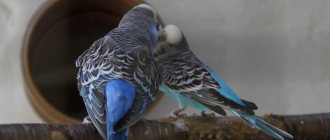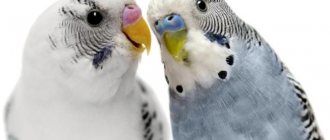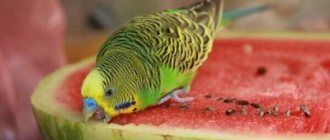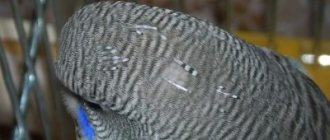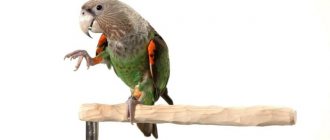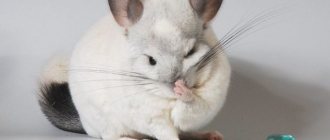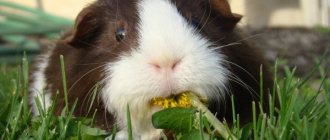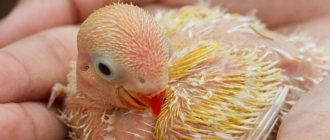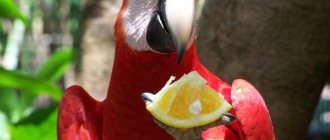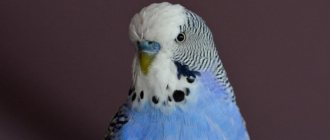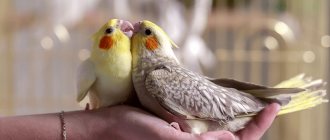A good owner knows a lot about his winged friend, but one can only guess why a parrot suddenly dies at home. When a person gets a tame parrot at home, he is preparing for a long life for his ward. There are several reasons for sudden death, which will be discussed in the article. You will learn what the signs of a dangerous condition are, whether your pet can be saved and what to do if it dies.
Why do parrots die
The fate of poultry depends on what care and maintenance the owner provides it. The lion's share of deaths occurs due to negligence of the owners. A person cannot always accurately determine that a parrot is dying. Trying to find the cause of the pet’s depressing condition, the owner wastes time. Meanwhile, the death of a parrot is provoked by two groups of factors: internal and external.
Internal factors
This category includes congenital and acquired diseases. The list of deadly diseases is impressive:
- tumors;
- infections (ornithosis, salmonellosis, tuberculosis);
- severe pathologies of feathers;
- endocrine system disorders;
- parasites;
- bird plague;
- developmental defects.
What can cause a parrot to die prematurely? The causes are often poor heredity or gender characteristics. Domesticated birds can live for a long time next to people and die only in old age.
Genetics
Chicks received from sick parents are born doomed. They have a set of genes with defects that do not allow them to live long. It is not always obvious from the appearance of a young parrot that he has a developmental defect. Therefore, the owner may not expect the imminent death of the ward. The bird is kept in good conditions, leads an active lifestyle, eats properly - and suddenly dies in the prime of life.
This is interesting! Parrots of spectacular show breeds are in most cases born from inbreeding. Despite their beautiful appearance, they are very weak in health and die early.
Bad purchase
If a novice poultry farmer goes to the market to buy a pet or takes it from the previous owner through an advertisement, he runs the risk of buying an elderly individual. Such a parrot will not live long in a new family: it will die of old age or stress. Middle-aged birds have difficulty getting used to another place of residence, become very sad and soon die. In addition, sick parrots are sold in dubious places, passing them off as healthy. Birds with weakened immune systems cannot withstand harsh conditions and die.
Reproductive system
The mortality rate is higher in females than in males. This is due to the characteristics of the reproductive system: females lay eggs and hatch chicks. If breeding episodes are repeated more than twice a year, the bird's body becomes depleted. In young individuals, especially during the first clutch, the birth process is difficult. Sometimes the egg lingers in the cloaca, putting pressure on the internal organs. Vital functions are disrupted and the parrot may die.
External factors
This group includes circumstances caused by the environment. In life, a parrot faces various difficulties. Many tame birds die from physical stress, emotional stress, and the conditions of their keeping.
Stress
Parrots are sensitive and capable of experiencing anxiety, fear, and sadness. Breeders are well aware of situations when, after a strong fright, a healthy bird dies. Simply moving to a new apartment, even with the same owner, becomes a cause of stress for the bird. Lonely individuals are at particular risk: without enough attention, they get bored and cannot occupy themselves. Over time, melancholy gives way to deep depression, the parrot refuses to eat, and he develops the habit of plucking feathers. If you do not bring the ward out of this borderline state, he will die.
Accident
Lovers of domestic animals are confident that nothing threatens tame parrots. This carelessness often turns against them: their feathered charges die due to oversight.
Common causes of death from injuries:
- burns from boiling water or open fire;
- electric shock;
- drowning;
- collision with an obstacle;
- pinching;
- animal attack;
- strangulation.
Attention! Children often accidentally cause severe injuries to birds. When letting a pet fly freely around the apartment, an adult family member must monitor and protect it.
Poisoning
Poisoning should be considered a separate item among dangerous incidents. Parrots are very curious; they try everything around with their beak. Sometimes such a craving for everything new leads to dire consequences: the feathered pet dies.
What substances cause poisoning?
- finishing materials (glue, paint, polyurethane foam, solvents);
- juice of poisonous indoor plants;
- household chemicals;
- Teflon.
With prolonged regular exposure to toxic fumes, the bird receives damage to internal organs that is incompatible with life. The most dangerous substances include household gas, aerosols, and tobacco.
Living conditions
A tame parrot must be closely monitored so that it does not die. Poor maintenance reduces a bird's chances of longevity. The owner may believe that his lifestyle is suitable for the ward, but the pet is forced to suffer. Fragile ornamental birds easily lose their health when exposed to unsanitary conditions, drafts and direct sunlight. Food of dubious quality disrupts digestion, and the parrot becomes infected with parasites through dirty water. If the bird is already sick, lack of proper care will only accelerate its death.
Other reasons
In addition to the above, other factors can pose a danger to your pet, for example, water in its drinking bowl or potted plants!
It is important to remember to also keep in mind the temperature of the parrot.
Water
Always monitor the purity and quality of the water. If the parrot does not drink for more than two days, it will die from dehydration; the wavy has a fast metabolism, which means that any ailment can instantly develop into a big problem, which without surgical intervention will end in death.
Do not forget to check the serviceability of the drinker; cases when the hole through which water enters is blocked are far from uncommon.
Plants
We are not always aware that plants in our home can be poisonous, so before letting your bird go for a walk, it is worth removing all the pots. This will help protect the plants themselves from the parrot, who will not disdain to ruffle the leaves for his pleasure.
A cactus, for example, can leave its needles in an active parrot after close contact, causing the wounds to become inflamed and cause serious discomfort to the bird.
Diseases
We are talking about diseases that could have been avoided with due attention to safety. One of the common mistakes made by the owner of a parrot is to move a new tenant in with the old ones, without quarantine.
Even if a new parrot is taken from friends or from a trusted pet store, it must be kept in a separate cage for a month, where you can observe the behavior, appetite, droppings and activity of the bird.
Do not kiss your parrot under any circumstances; your saliva can carry many pathogenic bacteria and fungi that will ultimately kill the bird. Also try to avoid contact with other parrots, we are talking about exhibitions.
Of course, every wavy owner wants to show off his pet, but you should think twice before taking part in an event where the infection can spread through the air.
A sick bird does not always differ in appearance from its healthy comrades; sometimes it acts as a carrier.
Overheat
Budgerigars are not able to tolerate heat; when the temperature rises, they will always strive to get into the shade, swim and quench their thirst. But when there is no way to hide from the sun, the wavy begins to develop hyperthermia, shortness of breath appears, and the body rapidly loses water.
Every budgerigar owner dreams of his feathered pet living a long and carefree life. As you know, these birds live for about 4-6 years, but in captivity they can easily live up to 12-16 years. But danger can lurk everywhere for a little parrot. If you do not secure the space where the bird lives and do not monitor its health, then premature death will occur.
How to understand that a parrot is dying
When a parrot is on the verge of life and death, it cannot be ignored. Based on changes in the behavior and appearance of the parrot, not only doctors, but also owners may suspect imminent death.
What are the signs that indicate a bird is about to die?
- regurgitation;
- convulsions;
- chaotic movements;
- head thrown to one side;
- paws are tense;
- film on the eyes;
- the parrot lies on its stomach or back;
- paralysis.
The bird is in agony from one hour to a day. In another scenario, events do not develop so clearly. The parrot dies quickly and quietly, without much suffering. Is it possible to save a pet? If you provide help on the spot, there will be little time left to get to the veterinarian.
Emotional problems
Many do not take this factor into account, whereas it is psychological problems that open the door to other, more dangerous diseases. When a bird experiences constant stress, it significantly shortens its life.
Yearning
In stores, parrots are kept in groups and they never get bored. But when the pet is left alone, and the owner does not pay enough attention to it, the bird falls into apathy. As a result, the immune system is undermined, weakness appears, and the bird fades away literally before our eyes.
Buying a pet is a responsibility. He shouldn't be left alone for long. Rare visits during feeding are not enough to normalize the emotional state of the bird.
Fear and severe stress
When a parrot is constantly under severe stress, it begins to beat around the cage or, on the contrary, hides in a corner, plucking its feathers. A pet’s heart may not be able to withstand severe fright, so it should be protected from sharp sounds, for example, a washing machine, TV, or loud human screams.
How to help a dying parrot
With the rapid progression of the disease, death is inevitable; the best medicines and excellent care will not help. In other cases, there is a chance that the parrot will not die, but here a significant role is played by the internal forces of the body. The owner must quickly decide what to do if his parrot dies. Having assumed what caused the dangerous condition, you need to urgently apply all available methods of assistance.
Support measures depending on the source of danger:
- Injury - apply a bandage to the wound, fix the fracture, hold the bird in your hands;
- Cramp - warm the pet by wrapping it in a towel;
- Shortness of breath and shock - inject with a corticosteroid intramuscularly;
- Poisoning – drink sorbent several times;
- Diarrhea and vomiting – take glucose and saline solution;
- For a chemical burn, lubricate the eyes with solcoseryl and also inject it into the beak.
Attention! At home, you can only temporarily support the life of a parrot with the necessary medications. After which you must definitely contact a specialist.
Delayed visit to the veterinarian
If a parrot has health problems, as a rule, it can still be helped. But for this you need to consult a veterinarian as soon as possible. Only he can determine the cause of the disease and prescribe the correct treatment. The specialist will tell you what the owner should do in this situation and whether there is a threat to the little friend’s life.
It is worth considering that the metabolism of birds is very fast. Even a slight illness can result in the death of a parrot in a matter of hours, so it is necessary to contact a veterinarian at the first signs of ill health.
A budgerigar is dying - why?
It is advisable to show your pet immediately to an ornithologist who specializes in exotic birds. Unfortunately, this is a profession in short supply, rarely found in small cities. You have to trust the life of your parrot to highly specialized veterinarians, among whom the diagnosis of diseases in birds is not up to par.
What to do if the parrot died
If you were unable to save your parrot, your worries are understandable. But you shouldn’t be discouraged, but you need to take care of a speedy burial. When the cause of death has not been established or the bird died after an infectious disease, the infection should be removed and the cage treated.
Burial
Dead birds cannot be buried within the boundaries of a populated area. If your city has a pet cemetery, this is a good option. An alternative is a summer cottage or forest belt. Having chosen a place on a hill, they dig a half-meter hole in the ground. The preferred depth is such that predatory animals cannot reach the body. The parrot is wrapped in cloth, placed in a box, which is then placed on the bottom. The hole is filled and compacted.
Cell disinfection
After the death of a pet, it is extremely rare that an autopsy is performed on the body, so it is impossible to reliably know the cause. But birds spread dangerous diseases: psittacosis, salmonellosis, chlamydia. The cage in which the parrot lived and died must be carefully treated, even if no one else will be placed in it.
Disinfection is carried out with creolin or xylonaft. Before using aggressive agents, wear a respirator, gloves, and goggles. Cover the cage with a disinfectant and leave for half an hour, and then rinse with plenty of water. Finally, scald with boiling water and dry for a week. After this, it can be used for other birds. Household items are soaked in the Ecocid-S solution. Dilute the liquid at the rate of 1 tablespoon per liter of water. If there are no further plans for feeders and toys, they are thrown away after disinfection.
Poor nutrition
You can kill a pet out of ignorance. Little children often want to pamper their pet and feed them something tasty. But there are some foods that are strictly contraindicated for budgies. First of all, these are fruits in sugar, melons, watermelons, mangoes, persimmons, papaya. Potatoes in any form are prohibited for budgies. The causes of death can be herbs, some types of nuts, salty and canned foods.
As you can see, if you follow some rules of caution, monitor the cage and clean it in a timely manner, and also feed your budgie correctly, you can extend its life. Monitor the condition of the bird, especially during changes in environment or other stressful situations, and do not hesitate to contact a specialist if necessary.
How to cope with loss
Each person copes with the death of a beloved pet in their own way. Some people isolate themselves alone with sadness, others need to talk it out and cry. If a parrot lived in a family for a long time and became attached to it, it will take more than one month for the pain to subside. This method often helps: get another animal that will return you to a full life, although it will not replace your pet.
When a parrot that has become part of the family dies, it is a grief for the owner and his loved ones. It no longer makes much difference whether the bird died from old age, illness or injury. But while he is alive, you need to treat him carefully, care for and protect him. And if trouble happens, you need to do everything possible to save yourself.
Signs of illness
Most people recognize the most obvious signs of illness in poultry, such as vomiting, loss of appetite, or the typical "loose" appearance. But some signs of illness may be difficult to recognize, such as subtle changes in behavior, habits, voice, or variations in the color or consistency of droppings.
That's why it's important to know what's normal for your budgie: what time he usually goes to bed, what his favorite treat is, how often he talks or sings, and more. A subtle change in a parrot's behavior is not normal as it could absolutely be a sign that something is wrong and this will help in time to realize that the parrot is dying.
Parrots can get sick for a variety of reasons.
Here is a short list of some signs of disease in birds:
Any of these changes or other changes noticed in budgies should be brought to the attention of a veterinarian to determine if it is a sign of something more serious.
Internal factors
Heredity
If the pet was kept in the right conditions, had a balanced diet and received everything it needed for a good life and suddenly died, do not rush to punish yourself. Perhaps the reason lies in the bird’s parents - from them the pet inherited a hidden disease that does not manifest itself just like that.
Pet Shop
A lot also depends on the place of purchase. Pet stores or poultry markets usually do not provide proper care for parrots, which leads to a weakened bird's immunity and the possibility of contracting dangerous diseases.
Also, an inexperienced person may acquire an old bird whose life is coming to an end, and nothing can be done about it.
Floor
Gender also affects the life of a bird. Females have a chance of dying from laying eggs - the egg can simply get stuck, and thereby compress vital organs.
Males can die from loneliness. A mirror hanging in a cage can lead to this - the bird will begin to feed it, and, not seeing a response, become depressed and refuse to eat.
